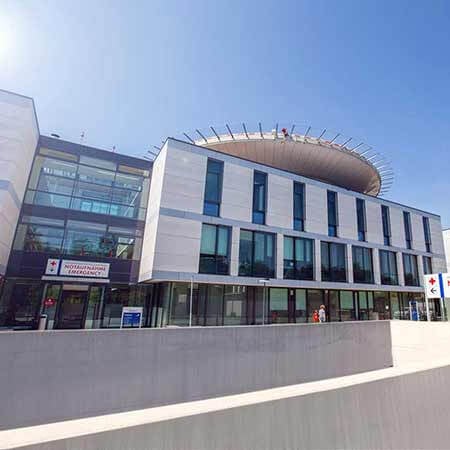Thyroid lymphoma is a malignant tumor of the lymphoid tissue. In developed countries, it is a curable disease. Doctors successfully deal with the treatment of patients with the aggressive types of neoplasms, including those with relapses or when the disease is detected at an advanced stage.
You can travel abroad for your thyroid lymphoma treatment with good results and minimal health risks. You are kindly welcome to make your treatment appointment at the best price through the Booking Health service.
Content
- What is thyroid lymphoma?
- Surgical treatment
- Radiation therapy
- Chemotherapy
- Immunotherapy and targeted therapy
- Treatment of relapses of therapy-refractory lymphoma
- Where to undergo treatment?
What is thyroid lymphoma?
Thyroid lymphoma is a rare oncological disease that accounts for up to 3% of all the neoplasms of this organ and up to 5% of extranodal lymphomas (developing outside the lymph nodes). In developed countries, the disease can be successfully treated. Doctors use surgery, radiation therapy, chemotherapy, and immunotherapy. The five-year survival rate for the patients with this disease is 80%, and the median survival is almost 12 years.
The term lymphoma of the thyroid gland reflects the location of the tumor, but not its type. The organ can be affected by various types of lymphomas. The most common is diffuse large B-cell lymphoma. Less common are MALT lymphoma and follicular lymphoma. Other histological variants also occur, but very rarely.
Diffuse large B-lymphoma has a poorer prognosis because it is usually diagnosed at the advanced stage. Nonetheless, doctors abroad have also learned how to deal with this disease successfully: the five-year survival rate of the patients has already reached 75%. It will only increase as new and more effective drugs appear. In other variants of the disease, the prognosis is more favorable: the five-year tumor-specific survival rate for follicular lymphoma is 87%, for MALT lymphoma, it reaches 96%, and for other non-Hodgkin's lymphomas, this indicator makes up 83%.
Thyroid lymphoma usually manifests itself as an enlarged mass in the front of the neck. The tumor disrupts breathing and swallowing, as well as causes an enlargement of the cervical lymph nodes. 10% of the patients already have symptoms at the time of establishing their diagnosis: night sweats, weight loss, and fever. The presence of these signs is a factor in a poor prognosis.
Surgical treatment
Doctors usually do not treat lymphoma using surgical techniques. This is due to the fact that the operation is not required. An early-stage disease can be treated with more sparing methods, such as radiation therapy. If the tumor has spread throughout the body, then chemotherapy and immunotherapy become the main methods of treatment.
However, thyroid lymphoma is an exception to this rule. More than half of patients undergo surgical treatment. There are several reasons for this:
- Insufficient diagnostic accuracy. Doctors suspect thyroid cancer in many patients, but the final diagnosis is made only after the removal of the organ.
- Compression symptoms. At the time of lymphoma detection, the patient may have breathing problems due to the compression of the larynx and trachea. Surgery is the fastest way to restore respiratory function.
- Contraindications to radiation therapy. For example, if a person has previously undergone neck irradiation for other diseases, the early-stage thyroid lymphoma can then be cured with the help of surgery.
A feature of the surgical treatment of lymphoma of the thyroid gland is that it is more sparing than the treatment of cancer of this organ. Doctors usually do not have to remove cervical lymph nodes. The thyroid gland itself is not entirely removed unless an attempt is made to treat the early-stage lymphoma without chemotherapy. As a rule, the diagnosis is already established by a biopsy at the time of treatment, and surgery is followed by radiation therapy or chemotherapy. Therefore, doctors perform a lobectomy or a subtotal thyroidectomy – they remove half of the thyroid gland and sometimes resect most of this organ. But still, a part of the thyroid gland is preserved, which avoids lifelong hormone replacement therapy. The compression symptoms of the neck organs disappear immediately after the operation, and the remaining malignant cells are subsequently destroyed with the help of radiation and medications.
Radiation therapy
Radiation therapy is considered the main treatment for early-stage thyroid lymphoma. It is the technique of choice for approximately 40% of patients with a newly diagnosed disease.
Radiation therapy can also be used after surgery. It allows doctors to destroy the remaining cancer cells in the thyroid gland and lymph nodes in order to cure the disease completely.
In the early stages, radiation therapy alone or in combination with surgery works well even without any chemotherapy. Therefore, approximately 30% of patients with thyroid lymphoma can avoid systemic treatment and the associated side effects accordingly.
Doctors in developed countries use the most advanced methods of radiation therapy. This affects the tumor with radiation and has practically no negative effect on the surrounding organs and tissues of the neck, including; large blood vessels, nerves, larynx, trachea, esophagus, cervical spine, and spinal cord.
Chemotherapy
For most patients with primary thyroid lymphomas, chemotherapy becomes the main and often the only treatment option. Approximately 70% of patients undergo this type of treatment. If the tumor is large, it is first removed or irradiated, followed by chemotherapy. In the absence of a threat of severe complications, the treatment can be started with chemotherapy: it will gradually reduce the size of both the primary tumor in the thyroid gland and all its metastases. In addition, the inclusion of glucocorticoids in the treatment regimen allows doctors to achieve significant symptom relief for their patients within a few hours after the start of chemotherapy. According to its results, tumor foci completely disappear in most patients.
The CHOP chemotherapy regimen remains the most commonly used one, although other drug combinations may also be applied. They are often supplemented with drugs for immunotherapy (R-CHOP scheme), and targeted therapy works well for some types of thyroid lymphomas.
Some patients may have their lymphoma spread to the structures of the central nervous system. In such situations, doctors resort to intrathecal chemotherapy (the administration of drugs into the CSF using a lumbar puncture) since the drugs do not penetrate the blood-brain barrier well and therefore do not have a good effect on metastases when administered intravenously.
Immunotherapy and targeted therapy
Immunotherapy is often used in addition to chemotherapy or as a standalone second-line treatment. Targeted therapy is usually not included in the standard treatment regimens and is used when other drugs do not work.
Doctors use the following types of drugs:
CD20 monoclonal antibodies target proteins on the surface of the lymphoma cells. This type of treatment has already become part of the standard first-line therapy for patients with any stage of thyroid lymphoma. The inclusion of monoclonal antibodies in the treatment regimen makes it more likely to cure the disease. The healthcare professionals abroad use both standard forms of drugs for the intravenous administration and more convenient subcutaneous forms, which are administered in just 5-7 minutes.
CD19 monoclonal antibodies are the drugs targeting the CD19 antigen. They are often used as a second-line therapy, along with immunomodulators (drugs that stimulate the immune system). This type of treatment is used in cases where the lymphoma has recurred after the primary treatment, does not respond to chemotherapy, and a stem cell transplant is contraindicated for a person. In addition to standard monoclonal antibodies, antibody-drug conjugates are also used abroad. They consist of an antibody and a chemotherapy drug. The antibody, targeting the CD19 protein, delivers the drug directly to the tumor cells.
Immune checkpoint inhibitors are rarely used for thyroid lymphomas. They reduce the ability of the tumor to evade the immune response.
Target therapy involves the use of proteasome, Bruton's tyrosine kinase, PI3K, EZH2, or nuclear export inhibitors. Some drugs only work for certain subtypes of lymphoma that have mutations in the genes. The patients are screened for these mutations before starting their treatment.
Treatment of relapses of therapy-refractory lymphoma
Doctors face the greatest challenge when the patient's lymphoma becomes resistant to chemotherapy. Doctors change the regimen of drug use, and sometimes this leads to a good therapeutic effect. But sooner or later, thyroid lymphoma loses its sensitivity to other drugs as well, continuing to grow in size and spread to the new parts of the body, even with the treatment provided.
Even for such severe cases, foreign doctors have the tools to fight against this disease. Doctors in developed countries use the following methods of treatment:
An autologous stem cell transplant is a procedure for transplanting the patient's own stem cells. First, doctors carry out high-dose chemotherapy to destroy all thyroid lymphoma cells in the patient's body. These doses of drugs also destroy the bone marrow. The pre-harvested stem cells are injected intravenously to restore it. They enter the bone marrow and multiply, as a result of which the production of blood cells resumes. In young patients, the bone marrow transplant procedure rarely causes severe complications, and at the same time, it can achieve long-term remission.
An allogeneic stem cell transplant is rarely used for lymphoma, as this variant of the procedure sometimes causes complications, and doctors are not always able to find a suitable donor for the patient. This is the second-line treatment option, which is used if thyroid lymphoma has recurred after the autologous transplant. The stem cell transplant from a donor works better because it activates the graft-versus-tumor effect. The renewed immunity attacks cancer cells and even destroys them completely, thus curing cancer.
CAR T-cell therapy is used to diffuse large B-cell lymphomas and follicular lymphomas if at least two methods of treatment have not led to a good therapeutic effect. Doctors harvest leukocytes (immune cells) from the patient, change their genome, multiply the altered cells and inject them into the patient's body. As a result, leukocytes attack the tumor and destroy it, thereby reducing it in size or destroying it completely.
Where to undergo treatment?
You can undergo your thyroid lymphoma treatment abroad. Doctors in developed countries successfully cure the disease in most patients. Moreover, they treat the pathology with the help of sparing methods and with minimal risk of severe complications. The specialists successfully cope with even the most aggressive and advanced tumors.
There are a few reasons for you to undergo your treatment abroad:
- a low frequency of surgical interventions: doctors usually manage to cope with the disease with the help of radiation therapy and drug treatment;
- the use of modern and patient-safe options for radiation therapy, which destroy the tumor almost without affecting the healthy tissues surrounding it;
- the use of modern chemotherapy regimens, which are often supplemented with immunotherapy and targeted therapy;
- patients have access to the latest drugs that are not yet used in countries with poorly developed medicine;
- even the most severe cases of lymphoma are successfully treated with stem cell transplant and CAR T-cell therapy.
You are kindly welcome to use the Booking Health service to see the cost of treatment in different hospitals, compare prices and make your treatment appointment at the best price. Please leave your request on our website: an employee from the Booking Health company will call you and help you to find the most suitable clinic. Our company's specialists will fully organize your trip abroad. When booking your treatment through the Booking Health service, the cost of treatment for your lymphoma will be lower due to the lack of additional fees for foreign patients.
Authors:
The article was edited by medical experts, board-certified doctors Dr. Nadezhda Ivanisova and Dr. Sergey Pashchenko. For the treatment of the conditions referred to in the article, you must consult a doctor; the information in the article is not intended for self-medication!
Sources:
National Center for Biotechnology
Cancer Research Institute
American Cancer Society










